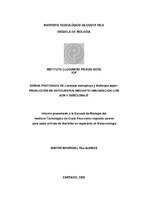Mostrar el registro sencillo del ítem
Serina proteasas de Lachesis stenophrys y Bothrops asper: producción de anticuerpos mediante inmunización con ADN y subclonaje
| dc.contributor.author | Madrigal-Villalobos, Marvin | es_CR |
| dc.date.accessioned | 2011-10-06T01:31:35Z | es_CR |
| dc.date.accessioned | 2011-11-25T22:34:36Z | |
| dc.date.available | 2011-10-06T01:31:35Z | es_CR |
| dc.date.available | 2011-11-25T22:34:36Z | |
| dc.date.issued | 2006 | es_CR |
| dc.identifier.uri | https://hdl.handle.net/2238/754 | es_CR |
| dc.description | Proyecto de Graduación (Bachillerato en Ingeniería en Biotecnología) Instituto Tecnológico de Costa Rica, Escuela de Biología, 2006. | es_CR |
| dc.description.abstract | El veneno de vipáridos contiene componentes tóxicos de naturaleza enzimática, dentro de los cuales se destacan serina proteasas por su contribución a provocar un desbalance del sistema hemostático. La baja proporción de anticuerpos especáficos para neutralizar toxinas de interés dentro de los sueros antiofídicos producidos de forma convencional, ha llevado a la obtención de los ADN codificantes para diversas toxinas y su clonación en vectores de expresión, con el fin de producir anticuerpos específicos mediante inmunización con ADN. En esta investigación, se inmunizaron ratones vía intravenosa con el ADN codificante para una serina proteasa del veneno de Lachesis stenophrys clonado en el plásmido pCI, y se realizó un subclonaje de una serina proteasa del veneno de Bothrops asper en el vector de expresión eucariota: pVAX1-UbC. Tras determinar el nivel de IgGs específicas para la serina proteasa de L. stenophrys en el suero de ratones inmunizados,se determiná la ausencia de una respuesta inmune específica mediante inmunización intravenosa, lo cual evidencia la necesidad de buscar nuevas estrategias para optimizar los constructos de ADN a ser utilizados. El subclonaje realizado constituye una de ellas, con el fin de estudiar a futuro el efecto regulador de un promotor muy conservado en mamíferos(el gen de la Ubiquitina C) sobre la expresión de la serina proteasa de B. asper. | es_CR |
| dc.description.abstract | Snake bites are a relatively common cause of accidental envenoming in humans and intravenous administration of heterologous antivenoms is the only effective treatment for systemic snakebite envenomings. These antivenoms are conventionally produced by fractionation of plasma from large animals, usually horses, hyperimmunized with a single crude venom or a mixture of venoms from different species. However, each venom is a highly diverse mixture of proteins, and only some venom proteins are responsible for the toxic effects of the venom. Therefore, the therapeutic value of antivenoms would theoretically be enhanced by restricting antibody specificity to toxic venom proteins. Immunization of animals with DNA encoding mutated versions or fragments of toxic proteins from bacteria induces a strong antibody response, which fully protects from the toxic effects of the native proteins. More recently, immunization with a plasmid encoding a fragment of a snake venom hemorrhagic toxin was shown to elicit the production of antibodies which effectively neutralize the holotoxin. Thus, the application of DNA immunization to the production of therapeutic antivenoms has the potential to provide a more cost-effective, less hazardous and more specific therapy than those currently used to treat envenoming by snake bites. Serine proteases are important components of pit viper venoms which contribute to cause an imbalance of the haemostatic system during snakebite envenomings. The aim of this work was to develop a DNA immunization strategy for antivenom production using full cDNAs encoding serine proteases from Bothrops asper and Lachesis stenophrys. Mice were immunized by intravenous injection with the cDNA encoding a snake venom serine protease from Lachesis stenophrys cloned in the plasmid vector pCI. No specific immune response was detected in the immunized animals, measuring the IgG levels against the serine protease by an ELISA. Looking for a new strategy to optimize the DNA constructs for immunization protocols, a snake venom serine protease of Bothrops asper was subcloned in the eukaryotic expression vector pVAX1-UbC. This subcloning will allow the study of the regulatory effect of a highly conserved promoter among mammals (the ubiquitin C gene) on the expression of the serine protease from B. asper. | |
| dc.format.extent | 874284 bytes | es_CR |
| dc.format.mimetype | application/pdf | es_CR |
| dc.language.iso | es | es_CR |
| dc.publisher | Instituto Tecnológico de Costa Rica | es_CR |
| dc.rights | acceso abierto | es |
| dc.subject | Inmunización | es_CR |
| dc.subject | BIOT | es_CR |
| dc.subject | BIOL | es_CR |
| dc.subject | ADN | es_CR |
| dc.subject | Ratones | es_CR |
| dc.subject | Serpientes | es_CR |
| dc.subject | Viperidae | es_CR |
| dc.subject | Lachesis | es_CR |
| dc.subject | Bothrops | es_CR |
| dc.subject | Venenos | es_CR |
| dc.title | Serina proteasas de Lachesis stenophrys y Bothrops asper: producción de anticuerpos mediante inmunización con ADN y subclonaje | es_CR |
| dc.type | proyecto fin de carrera | es_CR |


